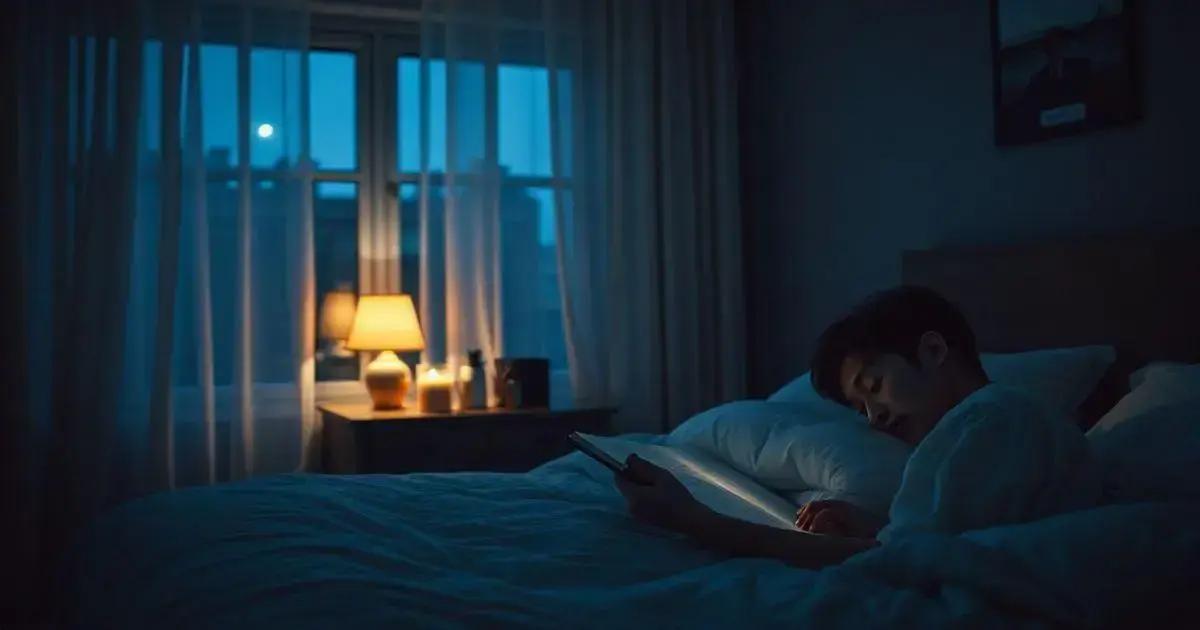Practicing gratitude before bed improves sleep quality, reduces anxiety, and enhances overall happiness. Techniques such as keeping a gratitude journal or verbally expressing thanks can strengthen relationships and promote better mental health.
Practicing gratitude before bed can significantly impact your quality of sleep and overall mental well-being. Incorporating this practice into your nightly routine can help you reflect on positive experiences, fostering a sense of contentment as you drift off to sleep. In this article, we’ll discuss why gratitude matters, how it improves sleep quality, and practical techniques you can easily adopt to experience real-life benefits.
Why Gratitude Matters

Understanding Gratitude is more than just saying thank you. It is a powerful emotion that can transform how we view our lives. When we express gratitude, we focus on our blessings rather than what we lack. This shift in perspective can influence our mental health positively.
Effects on Mental Health are profound. Research shows that those who practice gratitude regularly report lower levels of depression and anxiety. By acknowledging what we are thankful for, we create a habit of positivity that enhances our mood.
Strengthening Relationships is another benefit. Expressing gratitude to others can improve our relationships. It fosters kindness and encourages us to connect more deeply with people around us. A simple thank you can go a long way in building strong bonds.
Promoting Resilience is key as well. Gratitude helps us cope better with stress. When we face challenges, focusing on positive elements in our lives can serve as a buffer against negative feelings. This resilience is crucial for emotional well-being.
Scientific Backing for gratitude is compelling. Numerous studies indicate that practicing gratitude regularly can lead to significant improvements in overall happiness. For instance, individuals who write gratitude journals report happier moods and greater life satisfaction.
How Gratitude Improves Sleep Quality

Gratitude and Sleep Connection are closely linked. When we practice gratitude before bed, we encourage relaxation and peaceful thoughts. This process helps to quiet a racing mind, allowing the body to transition into a restful state.
Reducing Anxiety plays a crucial role here. Gratitude reduces feelings of anxiety and stress, two common barriers to good sleep. By focusing on positive experiences, we can decrease worry and fear that might keep us awake.
Improving Overall Mood before sleep can lead to deeper rest. Feeling thankful can elevate our mood, making it easier to fall asleep. A positive mindset leads to better sleep quality and a refreshed feeling in the morning.
Creating a Pre-Sleep Routine that includes gratitude can also signal our brains that it is time to wind down. Writing in a gratitude journal fosters a calm atmosphere, preparing us for a good night’s rest.
Scientific Research supports that maintaining a gratitude practice can lead to longer, more restorative sleep. Studies show that people who regularly engage in gratitude exercises experience fewer sleep disturbances and report feeling more rested.
Techniques for Practicing Gratitude Before Bed

Keeping a Gratitude Journal is a simple yet effective technique. Before bed, take a few minutes to write down three things you are grateful for. This helps shift your focus from worries to positive reflections.
Verbal Gratitude can also be powerful. Spend a few moments expressing your thanks, either aloud or in your mind. This can include thanking family members, friends, or yourself for the little things that went well during your day.
Gratitude Visualization is another technique. Close your eyes and visualize moments from your day that made you smile. Picture the people, places, and feelings associated with those happy moments before drifting off to sleep.
Setting a Gratitude Reminder can help establish the habit. Set a nightly reminder on your phone or place a note near your bed to prompt you to reflect on what you are grateful for each night.
Practicing Mindfulness alongside gratitude enhances the experience. Spend a few minutes doing deep breathing exercises while focusing on positive aspects of your life. This can calm your mind and body, preparing you for restful sleep.
Real-Life Benefits of Gratitude at Night

Better Sleep Quality is one of the most notable benefits of practicing gratitude at night. By focusing on positive thoughts and experiences, you create a peaceful mindset that facilitates falling asleep faster and enjoying deeper sleep.
Increased Happiness is another significant advantage. Gratitude encourages you to appreciate the positive aspects of your life. When you practice this before sleep, it can lead to enhanced overall happiness and satisfaction with life.
Stronger Relationships also develop through gratitude. Reflecting on people you are thankful for helps reinforce your bonds with them. Over time, this can lead to healthier and more supportive relationships.
Decreased Anxiety is a critical benefit as well. Concentrating on gratitude reduces focus on worries and stressors. Many people discover that they experience fewer anxious thoughts when they end their day with gratitude reflections.
Improved Mental Health results from a consistent gratitude practice. Studies indicate that people who express gratitude regularly report lower levels of depression and a greater sense of personal well-being.
In Summary: The Power of Gratitude Before Bed
Practicing gratitude before bedtime has numerous benefits for both mental and emotional health. By embracing techniques like keeping a gratitude journal, verbalizing thanks, and reflecting on positive experiences, you can enhance your sleep quality and overall happiness.
Through these practices, you build stronger relationships, reduce anxiety, and improve your overall sense of well-being. Make gratitude a part of your nightly routine to experience a peaceful mind and restful sleep.
By incorporating gratitude into your life, you can unlock its power to transform your nights, leading to brighter days ahead.
FAQ – Frequently Asked Questions About Practicing Gratitude Before Bed
What are the benefits of practicing gratitude before bed?
Practicing gratitude before bed can improve your sleep quality, increase your happiness, and reduce anxiety, leading to a more peaceful mind.
How can I incorporate gratitude into my nightly routine?
You can keep a gratitude journal, verbally express thanks, or visualize positive moments from your day to integrate gratitude into your bedtime routine.
Can gratitude really help improve relationships?
Yes, reflecting on what you’re grateful for, especially concerning others, can strengthen your relationships and encourage deeper connections.
Does practicing gratitude affect mental health?
Absolutely! Regularly practicing gratitude has been shown to lower levels of depression and improve overall mental well-being.
Is there scientific support for the effectiveness of gratitude?
Yes, numerous studies have demonstrated that practicing gratitude can lead to significant improvements in happiness, sleep quality, and mental health.
What if I find it hard to think of things to be grateful for?
Start small; focus on simple things like a warm meal or a good conversation. Over time, it can become easier to identify the positives in your life.













